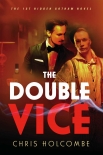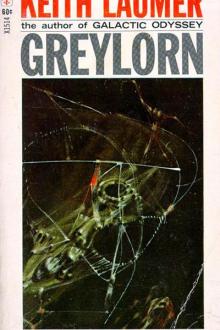Justice League of America - Batman: The Stone King Alan Grant (e book reader pc txt) 📖

- Author: Alan Grant
Book online «Justice League of America - Batman: The Stone King Alan Grant (e book reader pc txt) 📖». Author Alan Grant
The omens were obviously good, because Peter felt a warm, satisfied glow suffuse him. It–he–the Stone King was happy. The intruder was likely to be off guard, his mental defenses down. Maybe this was the time for Peter to reclaim himself, to fight for what belonged to him. His body. His life.
He was walking now, bare soles against hard-packed soil. Four figures trapped in living rock, like sculptures in a Paris park. Why were they captive? Peter didn't know if he'd forgotten, or if he'd never known. If they were his enemies, why were they still alive? What purpose did their continuing existence serve?
Yes, now was definitely the time to act, before his confusion became any worse.
He tried to prepare himself for struggle, for a battle of wills to be fought out in the arena of his own mind. But how does one fight a ghost? How do you drive out a malevolent five-thousand-year-old spirit?
Memory flash: breaking ribs and gushing blood. Something red and throbbing squirming in his hand.
A human heart? Peter wondered if a disembodied consciousness could vomit.
Truth is, Peter thought, I don't have a clue. I'm afraid, and I don't mind admitting it. Better to wait. Yes, bide my time. My chance will come. Sooner or later, my chance will come.
The Stone King held a chunk of quartz the size of a tennis ball in the palm of his hand. Slowly, his fingers closed around it, squeezing, exerting more and more pressure until–
Tiny pinpricks of light leaped from the quartz. First a dozen, then a hundred, snaking this way and that in the air, never colliding with each other as they whirled around at incalculable speed.
A practical demonstration of piezoelectricity!
Somewhere far away, Peter Glaston felt impressed. It looked like his theories weren't so far off the mark after all. That'd be one in the eye for the high and mighty Professor Robert Mills!
The quartz lights came together as if magnetized, coalescing into a larger, ovoid ball of plasma. Its internal shape shifted constantly, like the flames of a log fire. Peter gaped at it like a child seeing his first cartoon show. He fancied he saw pictures–of himself and Jenny, of heroes fighting to the bitter end, of distant cities burning.
The plasmoid ball dropped suddenly onto Green Lantern, playing around his head like the auras seen in medieval religious masterpieces. A tendril lanced out around Wonder Woman, then others to Superman and the Flash. None of the heroes reacted.
The light seemed to be performing its own crazed, intricate dance, shooting up in starbursts, rolling and twisting like a dervish in the Persian desert. Without warning it reared up, coiled itself like a living spring, then dove into the ground in a flash of cobalt blue.
The chamber lit up like the inside of a furnace, but the temperature didn't change.
Peter heard laughter issue from deep within himself, rumbling up through his diaphragm, bursting out to echo throughout the chamber. Laughter that might have come from the pits of hell.
Perhaps I'll wait just a little longer, then . . .
It was early afternoon in the Andes Mountains of Peru.
Three luxury tourist coaches and a host of battered minibuses baked in the dusty parking lot at the ruins of the fortress of Ollantaytambo, in the Sacred Valley of the Incas. Tourists of a dozen nationalities swarmed between the ancient walls, only half listening to the commentary of their guides.
Here and there, a few sat groaning on the ground or trying surreptitiously not to vomit. Altitude sickness. They should have heeded the guides when they recommended drinking coca tea. Far weaker than the refined powder, cocaine, the pale green brew had been used in the mountains for thousands of years for its beneficial properties. There was even a Museum of Coca in Cuzco, the old Incan capital.
Hiram Shipman was one of the afflicted, sitting with his back against a boulder, striving to hold down the bile in his churning stomach and wishing his head didn't feel like a blacksmith's anvil. It was the fourth day of his tour, and he'd already missed the wonders of the lost city of Machu Picchu, perhaps the most incredible engineering feat ever undertaken by man.
At an altitude of around ten thousand feet, the Incas had built an entire city on the vertiginous, near-vertical mountain peak. All Hiram remembered of it was the bright green grass, because every time he looked up he felt that his head was going to fall off his shoulders.
Back at the hotel, someone else on the tour, a loudmouth from Fort Worth, Texas, had suggested a couple of pisco sours. Everybody and his dog knew that brandy would settle any stomach. Against his better judgment, Hiram allowed himself to be persuaded. Three of the foul-tasting brandies later, he knew he had made a serious mistake.
Now Hiram was going to miss Ollantaytambo, too.
Folklore had it that the stone fortress was built by a senior Incan general. He'd fallen in love with the Emperor's daughter, a sacred maiden forbidden to mingle with the warrior caste. The couple eloped, accompanied by the general's faithful soldiers. Knowing her father had a duty to the Sun God to reclaim her, the couple built Ollantaytambo to hold the Emperor at bay.
The massive walls withstood siege for many years before there was a reconciliation. Everybody lived happily ever after. That was then. . . .
Hiram was enjoying a rare moment's intestinal peace, his head back against the stone, eyes closed against the fierce sun, when he felt the earth beneath him move. He gagged, his throat on fire, because everything solid had long since been regurgitated.
There was a loud crack, and a chunk of the stone he'd been leaning against broke away. It hit Hiram in the small of the





Comments (0)